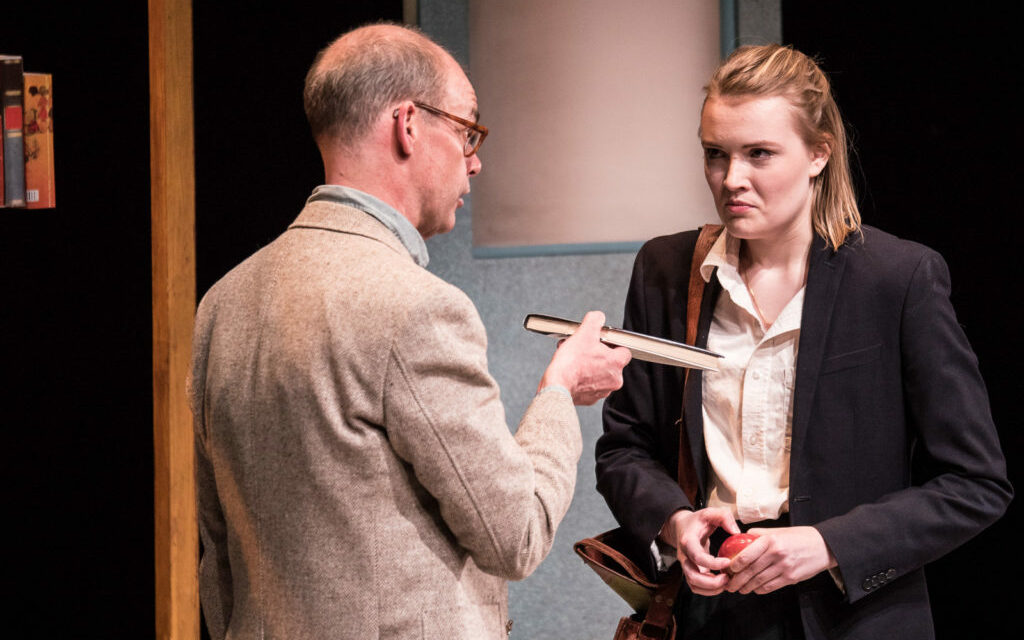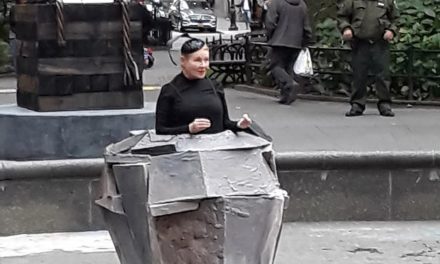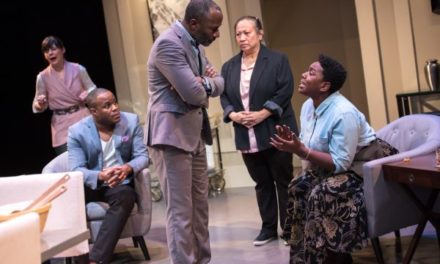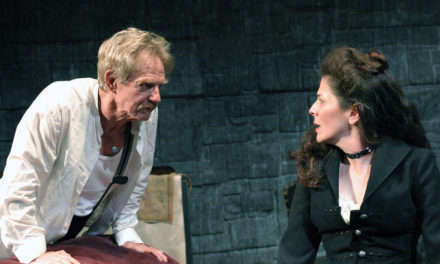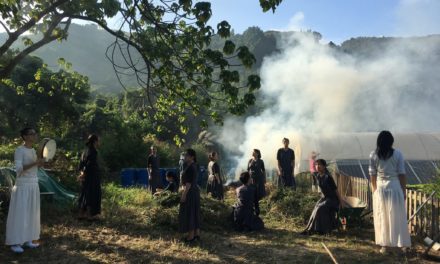A two-hander by Rose Napoli that has been given a fine production at the GCTC thanks to director Eric Coates’ delicate work with actors, Erica Anderson, and Geoff McBride. There is also the beautiful scenography constructed by Seth Gerry’s lighting design that speaks to the text in many ways and the clean lines of Brian Smith’s sleek set. Nevertheless, the play is troubling and even rather difficult to swallow because of the ethical questions it raises.
Before even seeing the show, I thought immediately of David Mamet’s Oleanna, where the playwright creates a complex relationship between a student and her professor that has dire consequences for the professor. Questions of sexual harassment, involving what appear to be vengeance and anger and much misunderstanding, clearly motivated or not, make Mamet’s work a lot more ambiguous and sophisticated than Napoli’s writing because we are never sure about the motives of the young lady. Has she been manipulated by a group of her peers? Has the prof’s apparent lack of sympathy encouraged her anger? She does not feel attracted to her professor in a sexual way, quite the contrary, so the story is very different, but we are still not sure where Mamet is leading us in spite of all the manipulation- or highly aggressive reactions that escalate to a great degree on the part of the female lead. The play still leaves us with many ethical questions as does Napoli’s play yet Laura’s feelings and her involvement with Alan makes this highly charged drama a lot clearer but difficult to swallow.
This play is built around an evolving relationship between Laura a 15-year-old student and her English teacher Alan alias Mr. Wells, who is in his forties. Age difference and the question of the teacher’s power and authority are therefore important because they underlie the notion of statutory rape which is not referred to in the script but which will certainly come to mind to mothers and fathers in the audience.
From the beginning, the clever dramatical structure places young Laura in a position where she becomes a narrative voice, telling what she feels, what she thinks the teacher is feeling as she seems to take notes that predate her present position on stage. Clearly, therefore, she has agency in this case which gives the young woman all the power to relate the story as she sees fit. That twist of perspective is very interesting and keeps our attention during the time of the performance.
The narrative is spoken in the present, as events are related to those of us who are in the audience listening to what has unfolded 10 years in the past when Laura was 15. Time therefore passes and this has to be noted. Laura’s form of literary discourse corresponds to the maturity of her own literary development and we hear that she now has a great talent as a writer as she reads her own comments about her relationship with Alan, noting or guessing his innermost feelings as she observes his responses in her mind’s eye. The whole event becomes a great literary encounter that she is finally able to grasp in her own creative way.
The play announces its colors from the beginning because the dramatical structure is set up in a circular movement, coming to the climax at the point the play begins. Quickly as time slips backward, we realize that Laura is an aggressive young girl with a highly active imagination who has a strong crush or perhaps even more’ than a crush, on her English teacher because he introduces her to great literature which she loves and she loves the way he reads. She is also given to hysterical over-reactions and emotional explosions that suggest she is normally immature for her age, but she loves words, has a good sense of observation but she also appears rather dangerous because of her delicate sensibility which is easily wounded and she tends to take statements literally, something that might seem strange for a writer who deals so often in metaphors. In other words, this young person is a walking emotional time bomb who has to be taken very seriously or else there will be consequences to pay.
Alan admires her because he recognizes her great talent as a writer and but tries to keep his personal life out of sight and tries to make it clear that he wants to help her professionally. She ignores his reactions by pushing forward with her own feelings, by insisting he listen to her and by invading his mental and physical space with fits of potential jealousy mixed with praise continuously creeping into his mind and no doubt flatter him as an older man.
However, it was not impossible to keep wondering how it was that his grown man did not recognize what was happening and how dangerous the situation was becoming for both of them. At that point, I wondered if Alan really was very intelligent and I lost interest in him completely as a character and began to foresee that what was going to happen might very likely be entirely his own fault.
Feelings, come to a boiling point and in one very aggressive scene, beautifully choreographed from behind where we see that both protagonists become predators of their own kind, the inevitable happens. At that point, both individuals are no longer terribly appealing because they find themselves in situations where they have both lost control of themselves. This is probably to be expected in a love story but this power game is so unequal and has so little to do with love at this point that it just appears to be ridiculous, especially when Alan expresses moments of jealousy and Laura’s feelings become more and more violent and vindictive. None of their effusions of feeling are easy to understand and they have lost all their flamboyancy as heroes in a literary adventure that Laura seems to want us to believe.
The ending just seems to slither away like a bad dream and Laura, will come out of it a more mature person ten years later, while blaming Alan’s behavior for her great success! Which shows you can have your cake and eat it too!
Mamet had a very specific aim. He was fed up with political correctness and his nasty drama made that very clear. Napoli’s play is perhaps a warning for young girls to avoid older men, especially in a school situation but we feel that the playwright is just as angry at the male protagonist as she is forgiving of the young girl who came on to the teacher but then was rewarded by gaining a form of maturity and having a literary career set out before her since this adventure helped her mature. Perhaps there is something in that. Nevertheless, I did not find this material well thought out although it might have been difficult to do so, given all the ethical traps that emerged.
A problematic play not suited to all tastes, but which is very well acted. Erica Anderson repeats her magnificent Gracie performance and becomes completely convincing as the very unusual Laura, while Geoff McBride, less and less sympathetic as the play unfolds, makes his character even more convincing as he loses ground. The problem for the audience then is trying to reconcile all these opposing feelings! I must admit it is not easy.
This article was originally posted on Capital Critic’s Circle on May 4 and has been reposted with permission.
This post was written by the author in their personal capacity.The opinions expressed in this article are the author’s own and do not reflect the view of The Theatre Times, their staff or collaborators.
This post was written by Alvina Ruprecht.
The views expressed here belong to the author and do not necessarily reflect our views and opinions.

